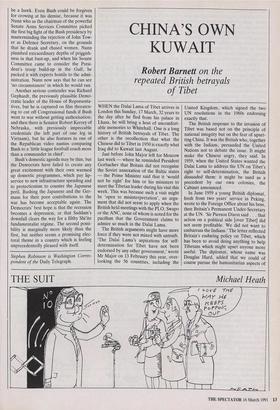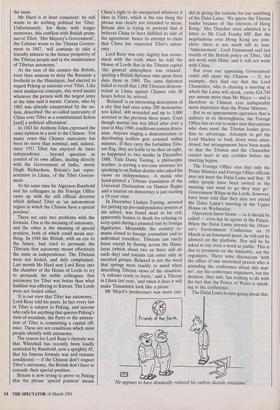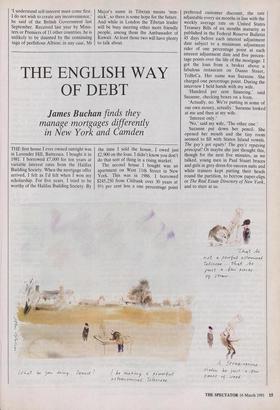CHINA'S OWN KUWAIT
Robert Barnett on the repeated British betrayals of Tibet
WHEN the Dalai Lama of Tibet arrives in London this Sunday, 17 March, 32 years to the day after he fled from his palace in Lhasa, he will bring a host of uncomfort- able memories to Whitehall. One is a long history of British betrayals of Tibet. The other is the recollection that what the Chinese did to Tibet in 1950 is exactly what Iraq did to Kuwait last August.
Just before John Major left for Moscow last week — where he reminded President Gorbachev that Britain did not recognise the Soviet annexation of the Baltic states — the Prime Minister said that it 'would not be right' for him or his ministers to meet the Tibetan leader during his visit this week. This was because such a visit might be 'open to misinterpretation', an argu- ment that did not seem to apply when the British held meetings with the PLO, Swapo or the ANC, none of whom is noted for the pacifism that the Government claims to admire so much in the Dalai Lama.
The British arguments might have more force if they were not mixed with untruth. 'The Dalai Lama's aspirations for self- determination for Tibet have not been endorsed by any other government,' wrote Mr Major on 13 February this year, over- looking the 56 countries, including the United Kingdom, which signed the two UN resolutions in the 1960s endorsing exactly that.
The British response to the invasion of Tibet was based not on the principle of national integrity but on the fear of upset- ting China. It was the British who, together with the Indians, persuaded the United Nations not to debate the issue. It might make the Chinese angry, they said. In 1959, when the United States wanted the Dalai Lama to address the UN on Tibet's right to self-determination, the British dissuaded them: it might be used as a precedent by our own colonies, the Cabinet announced.
In June 1959 a young British diplomat, fresh from two years' service in Peking, wrote to the Foreign Office about his boss, then Britain's Permanent Under-Secretary at the UN. 'Sir Pierson Dixon said. . . that action on a political side [over Tibet] did not seem profitable. We did not want to embarrass the Indians.' The letter reflected Britain's enduring policy on Tibet, which has been to avoid doing anything to help Tibetans which might upset anyone more useful. The diplomat, whose name was Douglas Hurd, added that we could of course pursue the humanitarian aspects of the issue.
Mr Hurd is at least consistent: he still wants to do nothing political for Tibet.
Unfortunately, for those with longer memories, this conflicts with British prom- ises to Tibet. 'Her Majesty's Government', the Cabinet wrote to the Tibetan Govern- ment in 1947, 'will continue to take a friendly interest in the future prosperity of the Tibetan people and in the maintenance of Tibetan autonomy.'
At the turn of the century the British, even then anxious to deny the Russians a foothold in the Himalayas, had elected to regard Peking as suzerain over Tibet. Like most mediaeval concepts, this word meant whatever the person with the largest army at the time said it meant. Curzon, who by 1903 was already exasperated by the no- tion, described 'the so-called suzerainty of China over Tibet as a constitutional fiction [and] a political affectation'. In 1943 Sir Anthony Eden expressed the same opinion in a note to the Chinese. 'For many years this Chinese suzerainty has been no more than nominal, and, indeed, since 1911 Tibet has enjoyed de facto independence . . . beyond question in control of its own affairs, dealing directly with the Government of India,' wrote Hugh Richardson, Britain's last repre- sentative in Lhasa, of the Tibet Govern- ment.
At the same time Sir Algernon Rumbold and his colleagues in the Foreign Office came up with the still official doctrine which defined Tibet as 'an autonomous region in which the Chinese have a special position'.
There are only two problems with the formula. One is the meaning of autonomy, and the other is the meaning of special position, both of which could mean any- thing. In 1949 the British, with an eye to the future, had tried to persuade the Tibetans that autonomy meant effectively the same as independence. The Tibetans were not fooled, and duly complained. Last month Mr Hurd sent Lord Reay into the chamber of the House of Lords to try to persuade his noble colleagues that autonomy for Tibet was better than what Saddam was offering to Kuwait. The Lords were not fooled either.
'It is our view that Tibet has autonomy,' Lord Reay told his peers. In fact every law in Tibet is subject to Peking, and anyone who calls for anything that queries Peking's view of socialism, the Party or the annexa- tion of Tibet is committing a capital off- ence. These are not conditions which most people identify with autonomy.
The reason for Lord Reay's rhetoric was that Whitehall has recently been loudly reminded by Rumbold, now a sprightly 85, that his famous formula was and remains conditional — if the Chinese don't respect Tibet's autonomy, the British don't have to concede their special position.
Britain is now trying to prove to Peking that the phrase 'special position' means China's right to do unopposed whatever it likes in Tibet, which is the one thing the phrase was clearly not intended to mean.
Britain also is trying to pretend that it believes China to have fulfilled its side of the agreement: hence its attempt to claim that China has respected Tibet's auton- omy.
Lord Reay was only slightly less econo- mical with the truth when he told the House of Lords that in the Tibetan capital 'the general atmosphere was relaxed', quoting a British diplomat who spent three days there in 1989. The same diplomat failed to recall that 1,000 Tibetans demons- trated in Lhasa against Chinese rule 48 hours before he arrived.
'Relaxed' is an interesting description of a city that had seen some 200 demonstra- tors killed, 400 wounded and up to 3,000 arrested in the previous three years. Even though martial law was lifted after over a year in May 1990, conditions remain draco- nian. Anyone staging a demonstration or distributing leaflets gets arrested within minutes. If they carry the forbidden Tibe- tan flag, they are liable to be shot on sight, as happened to two monks in December 1988. Yulu Dawa Tsering, a philosophy teacher, is serving a ten-year sentence for speaking to an Italian dentist who asked his views on independence. A monk who hand-printed a Tibetan translation of the Universal Declaration on Human Rights and a treatise on democracy is just starting a 19-year stint.
In December Lhakpa Tsering, arrested for putting up pro-independence posters at his school, was found dead in his cell, apparently beaten to death for refusing to keep quiet during a planned visit by foreign dignitaries. Meanwhile the country re- mains closed to foreign journalists and to individual travellers. Tibetans can rarely leave except by fleeing across the Hima- layas (which about two or three still do each day) and tourists can enter only in escorted groups. Relaxed is not the word that springs most readily to mind when describing Tibetan views of the situation. 'A volcano ready to burst,' said a Tibetan in Lhasa last year, 'and when it does it will make Tiananmen look like a picnic.'
Mr Major's predecessor was more can- did in giving the reasons for our snubbing of the Dalai Lama. 'We ignore the Tibetan leader because of 'the interests of Hong Kong,' Mrs Thatcher once admitted in a letter to Mr Cecil Franks MP. But the negotiations over Hong Kong are com- plete: there is not much left to lose. 'Appeasement', Lord Grimmond said last month of the British policy on Tibet, 'did not work with Hitler and it will not work with China.'
But even our appeasing Government could still upset the Chinese — if, for example, they find out that the Lord Chancellor, who is chairing a meeting at which the Lama will speak, earns £24,749 per annum more than Mr Major — and is therefore in Chinese eyes indisputably more important than the Prime Minister.
But in an appeasement operation that is military in its thoroughness, the Foreign Office has set out to make sure that anyone who does meet the Tibetan leader gives him no advantage. Attempts to get the Lord Mackay to back down were aban- doned, but arrangements have been made so that the Tibetan and the Chancellor cannot meet in any corridor before the meeting begins.
The Foreign Office says that only the Prime Minister and Foreign Office officials may not meet the Dalai Lama and that, `If other people have been invited to the meeting and want to go they may go.' Government Whips in the Lords, however, have been told that they may not attend the Dalai Lama's meeting in the Upper House on Wednesday.
Operation Snow Storm — as it should be called — even has its agents at the Palace. When the Dalai Lama attends the Obser- ver's Environment Conference on 19 March as an honoured guest, he will not be allowed on the platform. Nor will he be asked to say even a word in public. This is due to pressures on the timetable, say the organisers. There were discussions 'with the office of one interested person who is attending the conference about this mat- ter', say the conference organisers, but the decision, they add, has nothing to do with the fact that the Prince of Wales is speak- ing at the conference.
The Dalai Lama is easy-going about this.
We appears to have drastically reduced his carbon dioxide emissions.'
'I understand self-interest must come first. I do not wish to create any inconvenience,' he said of the British Government last September. Received last year by Minis- ters or Premiers of 11 other countries, he is unlikely to be daunted by the continuing saga of perfidious Albion; in any case, Mr Major's name in Tibetan means 'non- stick', so there is some hope for the future. And while in London the Tibetan leader will be busy meeting other more friendly people, among them the Ambassador of Kuwait. At least those two will have plenty to talk about.




























































 Previous page
Previous page